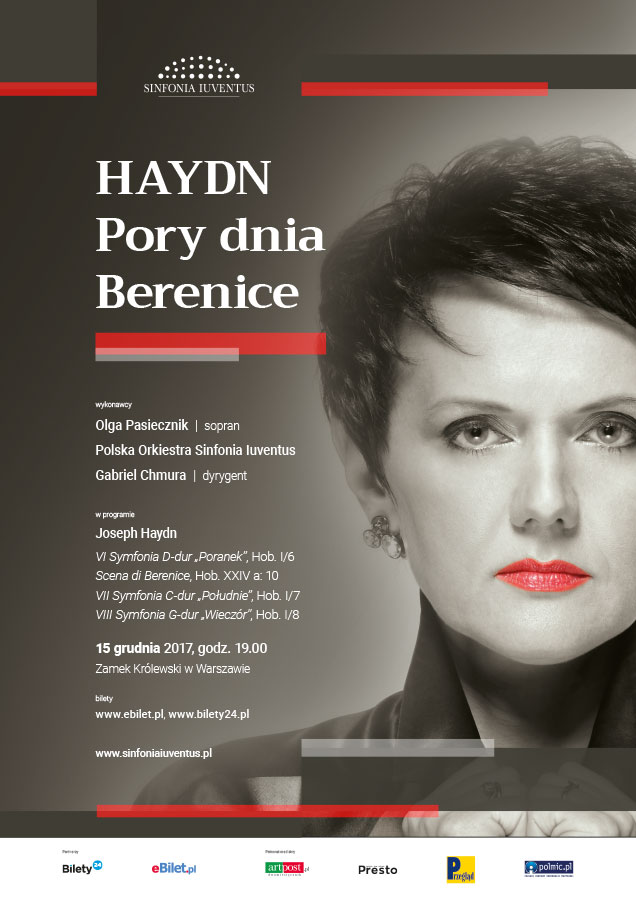HAYDN. The Day Trilogy | Berenice
The Polish Sinfonia Iuventus Orchestra invites you to the „HAYDN. The Day Trilogy | Berenice” concert, conducted by Maestro Gabriel Chmura. Olga Pasiecznik, one of the most famous singers from Ukraine, who has been living in Poland for years, will take on the title role of Berenice.

There is no one in the world who doesn’t know Vivaldi’s famous Four Seasons. Joseph Haydn also composed an oratorio devoted to these astronomical periods in the late phase of his work, while three symphonies devoted to different time periods – times of day – are an interesting curiosity. There are some mentions that there were supposed to be four works (just like in Telemann’s cantata cycle of the same title – perhaps known to Haydn?), but if „Night” was one of them, it has not survived and today the cycle consists of three: Morning, Noon and Evening, annotated in the scores with French titles. Interestingly enough, this is the only symphonic cycle connected by a common programme in the entire enormous legacy of the composer. It was probably created around 1761, shortly after the great composer took up the post of the vice-band leader of the ensemble of Prince Pál Esterházy (who soon died, and Haydn spent the next creative decades in the service of his successor, Miklós). These charming Rococo works are evidence of the intensive search for a new expression of the hitherto simple sinfonia of Baroque provenance and its transformation into a mature, classic symphony. Before the finals, a minuet appears (and will stay for a long time), and the interesting and innovative orchestration provides spectacular solo parts for the excellent musicians of the Prince’s band.The theme itself is illustrated with subtle “figures”, such as the crescendo – an allegory of sunrise in Morning, the moving recitative “prayer” in the “noontide” symphony or a violent storm in the finale of Noon.
Thirty years later, after the death of his employer, Haydn, who was already famous, accepted an invitation to London, where he was greeted with great respect and admiration. The contracts he entered into while in the city contained, apart from composing symphonies (two famous cycles called „The London Symphonies”), a commission of L’anima del filosofo – however, for financial reasons, the premiere was cancelled and the work remained unfinished. It was the composers last meeting with the opera genre – or rather almost the last one. During his second visit to London in 1795, he wrote the dramatic scene Berenice, che fai for Italian singer Brigida Banti, using the expressive text from Pietro Metasiasio’s Antigono (for which music was composed by, among others, Gluck). In the work, Berenice mourns the (alleged) suicidal death of her beloved Demetrio. Brigida Banti was one of the most acclaimed singers of her time and was at the peak of her fame, although her performance of Scena di Berenice did not thrill the critics. Perhaps this was due to the singer’s being indisposed or, more likely, a certain confusion resulting from the astonishing modulations used by Haydn. Banti, according to contemporary accounts, never mastered reading music, learned her parts from hearing and was probably not used to works with such sophisticated harmony. In Berenice, che fai, Haydn shows enormous mastery in „musicalising” the Italian text, the orchestral part is also perfectly and unconventionally put together – we can only regret that circumstances did not permit him to take on a libretto worthy of his talent in a later period. We can, however, delight in the fact that during the Polish Sinfonia Iuventus Orchestra concert, the role of the emotion-torn Berenice will be sung by one of the most acclaimed singers, Olga Pasiecznik from Ukraine, who has been living in Poland for years. Pasiecznik is adored by audiences for many unforgettable opera and oratorial roles, as well as her wonderful song repertoire. The concert will be led by Gabriel Chmura, who was the art director of the National Symphony Orchestra of the Polish Radio in Katowice in 2001-2007. Currently, he works with the Grand Theatre in Warsaw and Poznań, where he is the artistic director. He has won acclaim on the stages of many countries and often collaborates with the Polish Sinfonia Iuventus Orchestra, with whom he recorded a well-received album in 2017, featuring performances of symphonies by Prokofiev and Wajnberg.
Performers:
Olga Pasiecznik | soprano
Polish Sinfonia Iuventus Orchestra
Gabriel Chmura | conductor
Programme:
Joseph Haydn
6th Symphony in D major „Morning”, Hoboken I/6
Scena di Berenice, Hoboken XXIV a: 10
7th Symphony in C major „Noon”, Hoboken I/7
8th Symphony in G major „Evening”, Hoboken I/8
